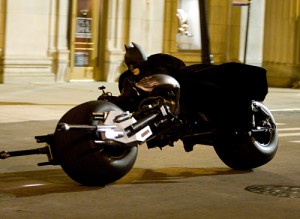 In the lead-up to the film’s release, Nolan mentioned that the character of Harvey Dent/Two-Face was the emotional heart of the film. I had suspected that was Nolan’s way of “throwing a bone” to actor Aaron Eckhart, lest his performance be lost in the mania surrounding Ledger’s epic turn. But Nolan spoke rightly, as Dent’s character ties the film together. He represents the drama of the individual soul, as both good and evil, the way of Satan and the way of Christ, wage war for its allegiance. The Joker seeks to draw Dent, a D.A. crusading against evil and recovering from a horrific accident, into sharing his hell-bent way of life, as Satan did with our first parents (Gen. 3). Dent takes the bait and, as Two-Face, begins a reign of murder of his own, like Cain. Batman vicariously substitutes himself for Dent, taking the blame for Dent’s crimes and making himself public enemy #1 in the process, echoing Jesus’ self-dereliction on the cross.
In the lead-up to the film’s release, Nolan mentioned that the character of Harvey Dent/Two-Face was the emotional heart of the film. I had suspected that was Nolan’s way of “throwing a bone” to actor Aaron Eckhart, lest his performance be lost in the mania surrounding Ledger’s epic turn. But Nolan spoke rightly, as Dent’s character ties the film together. He represents the drama of the individual soul, as both good and evil, the way of Satan and the way of Christ, wage war for its allegiance. The Joker seeks to draw Dent, a D.A. crusading against evil and recovering from a horrific accident, into sharing his hell-bent way of life, as Satan did with our first parents (Gen. 3). Dent takes the bait and, as Two-Face, begins a reign of murder of his own, like Cain. Batman vicariously substitutes himself for Dent, taking the blame for Dent’s crimes and making himself public enemy #1 in the process, echoing Jesus’ self-dereliction on the cross.Dent’s marred visage points to the potential evil lurking within all of us, and the ugliness of sin, although the capacity for good remains. Gotham is not Calvin’s Geneva, with its “total depravity” of mankind – a view the Joker shares. “When the chips are down, these people will eat each other, you’ll see”. The inherent good in human nature shines through even in a film dark as this, as the Joker discovers when his plan to cause citizens to kill each other fails in the most surprising of ways. Dent’s character beautifully represents the power of good example and also the nagging pull of original sin, and the choice we must all make each day: to give in to the darkness or strive for heroic virtue. Harvey Dent/Two-Face is like Simon/Peter, and so are we. We are like Simon when our faith fails; when we sin and deny our Lord by our actions. We are like Peter when we choose the light of Christ in a dark world – as Dent once tried to be: “decent men in an indecent world”.
A great theme in TDK is the personal cost involved in standing against evil. As any Christian knows, the moment one attempts to subdue sin, in one’s own life or in the culture, the spiritual battle intensifies. Temptations to fall increase, like Dent discovered firsthand: the darkness hates the light. But choosing not to stand is far worse. As Edmund Burke said so long ago, “All that is necessary for the triumph of evil is for good men to do nothing.” Intentions are not enough. We must have, as does Batman, the will to act. A line from The Dark Knight himself, uttered in Batman Begins, says it well: “It’s not who I am underneath, but what I do that defines me.” And so it is with us all.


Trackbacks & Pingbacks
[…] find my two-part article on the Batman film “The Dark Knight” in the archives here and here as […]
Leave a Reply
Want to join the discussion?Feel free to contribute!